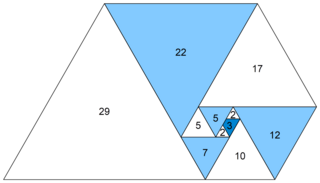Related Research Articles
In number theory, the Fermat pseudoprimes make up the most important class of pseudoprimes that come from Fermat's little theorem.
23 (twenty-three) is the natural number following 22 and preceding 24.
73 (seventy-three) is the natural number following 72 and preceding 74. In English, it is the smallest natural number with twelve letters in its spelled out name.
64 (sixty-four) is the natural number following 63 and preceding 65.
1000 or one thousand is the natural number following 999 and preceding 1001. In most English-speaking countries, it can be written with or without a comma or sometimes a period separating the thousands digit: 1,000.
300 is the natural number following 299 and preceding 301.
700 is the natural number following 699 and preceding 701.
600 is the natural number following 599 and preceding 601.
2000 is a natural number following 1999 and preceding 2001.
3000 is the natural number following 2999 and preceding 3001. It is the smallest number requiring thirteen letters in English.
4000 is the natural number following 3999 and preceding 4001. It is a decagonal number.
5000 is the natural number following 4999 and preceding 5001. Five thousand is, at the same time, the largest isogrammic numeral, and the smallest number that contains every one of the five vowels in the English language.
7000 is the natural number following 6999 and preceding 7001.
8000 is the natural number following 7999 and preceding 8001.
145 is the natural number following 144 and preceding 146.

1,000,000,000 is the natural number following 999,999,999 and preceding 1,000,000,001. With a number, "billion" can be abbreviated as b, bil or bn.
257 is the natural number following 256 and preceding 258.
60,000 is the natural number that comes after 59,999 and before 60,001. It is a round number. It is the value of (75025).

In mathematics, the Perrin numbers are a doubly infinite constant-recursive integer sequence with characteristic equation x3 = x + 1. The Perrin numbers bear the same relationship to the Padovan sequence as the Lucas numbers do to the Fibonacci sequence.
840 is the natural number following 839 and preceding 841.
References
- ↑ Sloane, N. J. A. (ed.). "SequenceA050217(Super-Poulet numbers: Poulet numbers whose divisors d all satisfy d|2^d-2.)". The On-Line Encyclopedia of Integer Sequences . OEIS Foundation.
- ↑ Sloane, N. J. A. (ed.). "SequenceA001567(Fermat pseudoprimes to base 2, also called Sarrus numbers or Poulet numbers.)". The On-Line Encyclopedia of Integer Sequences . OEIS Foundation.